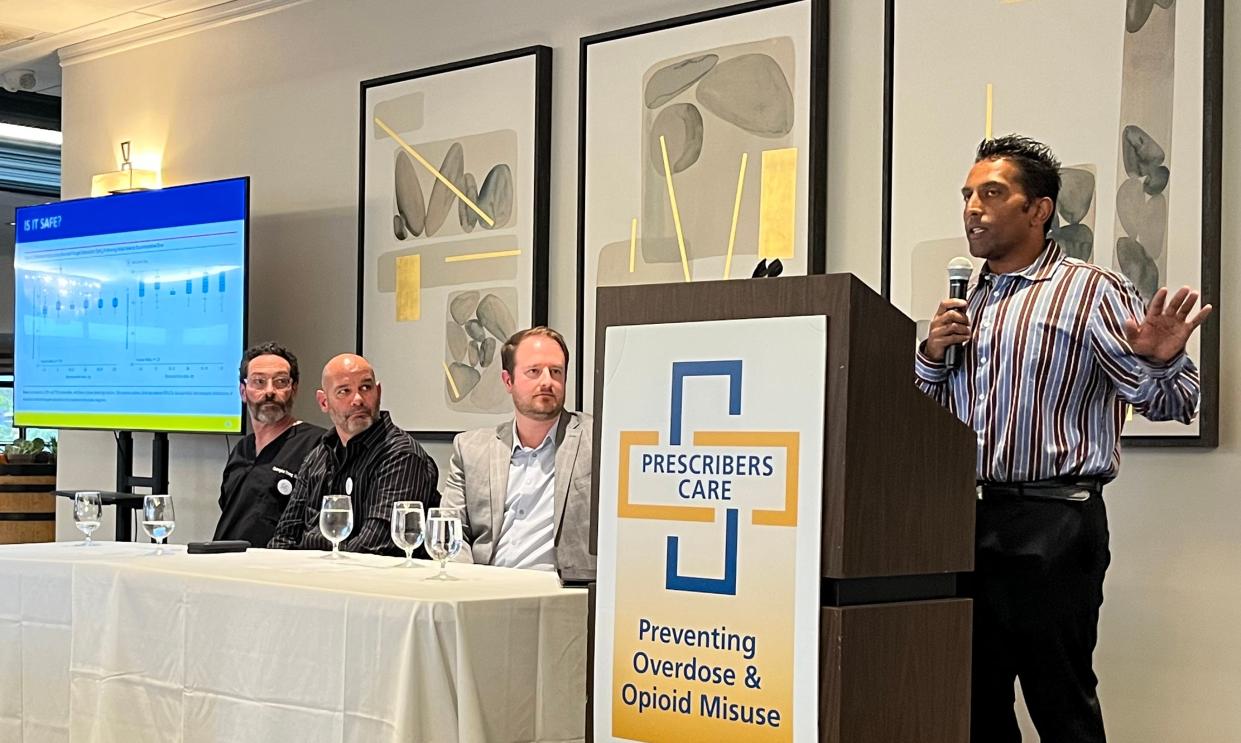Ventura County doctors strategize in fight against fentanyl

In a typical week in Ventura County, two people die in motor vehicle accidents and two die by suicide. Someone is killed by homicide about every other week. And in an average week, five people die of drug overdoses, most of them with the synthetic opioid painkiller fentanyl in their systems.
Tuesday was “Fentanyl Awareness Day” and to mark the occasion, the Ventura County Health Care Agency convened a panel on fentanyl abuse in Ventura County and how to deal with it, from both medical and law enforcement approaches. The event, held at Las Posas Country Club near Camarillo, was part of the Health Care Agency’s “Prescribers Care” series of events for medical professionals.
The message from the doctors on the panel was that addiction to fentanyl and other opioids is treatable, through a combination of medication and behavioral therapy. The prescription drug buprenorphine, which is used in Suboxone and other medications, relieves the symptoms of opioid withdrawal and eases cravings, and doctors at Tuesday’s event were urged by the panelists to prescribe it to patients suffering from opioid addiction.
“Fentanyl is killing people, so at this point you need to treat it like a disease epidemic,” said Dr. Joseph Vlaskovits, a psychiatrist who is the director of substance abuse treatment services for the Ventura County Behavioral Health Department. "The patient is not coming to you for judgment. They’re coming to you for care, and we have a way of treating this effective and safely.”
Fentanyl was present in 181 of the 253 fatal overdoses in Ventura County in 2022, according to data released in March by the Ventura County Medical Examiner’s Office. Though the number of fatal overdoses dropped slightly from 2021 to 2022, they remained far higher than in any previous year, and overdoses that included fentanyl were up 10% in a year. In five years, there was a 722% increase in fatal fentanyl overdoses, from 22 in 2017 to 181 in 2022.
Nationwide, drug overdoses passed car accidents in 2008 as the most common cause of accidental death, said Dr. Christopher Young, Ventura County’s medical examiner and a panelist at Tuesday’s event. In Ventura County, drug overdoses accounted for more than half of all accidental deaths in 2022, he said.
Young said the fentanyl crises began on the East Coast in the 2010s and reached Ventura County in earnest in 2020. The death toll since then has been “staggering,” he said.
The victims can be any age, though people in their 30s and 40s are dying the most often, Young said. And they come from all walks of life – contrary to stereotypes, only about 30% of fatal overdose victims in Ventura County are homeless, he said.
Some drug users do seek out fentanyl, usually to smoke it, but even those who aren’t trying to consume it can die from it, the panelists said. Fentanyl is now present in most of the heroin and much of the methamphetamine sold on the streets of Ventura County, and many of the pills sold as opioids, Xanax and other pharmaceuticals are counterfeit products laced with fentanyl.
“These cartels, they don’t get Google reviews, they don’t go on Yelp. If you OD, you don’t get your money back, so they don’t care,” said panelist John Hajducko, a sergeant with the Ventura County Sheriff’s Office and a member of the county’s drug crimes task force.
The task force includes representatives of every law enforcement agency in the county, and Hajducko said the District Attorney’s Office is “wholeheartedly behind the prosecutions” of fentanyl dealers.
But law enforcement can't solve what is primarily a public health problem, the panelists agreed. Doctors have a level of trust with their patients that a police officer can never have, Hajducko said, and they can leverage that trust to help keep people safe and help them recover from addiction.
Vlaskovits said doctors have long seen addiction as "somebody else's problem."
"I think it brings up in us uncomfortable emotions," he said. "Revulsion – we don't like what they're doing to themselves and their bodies. It really bothers us, and at times that leaves us unable to treat them like human beings and get them the care they need."
Tony Biasotti is an investigative and watchdog reporter for the Ventura County Star. Reach him at tbiasotti@vcstar.com. This story was made possible by a grant from the Ventura County Community Foundation's Fund to Support Local Journalism.
This article originally appeared on Ventura County Star: Ventura County doctors strategize in fight against fentanyl

